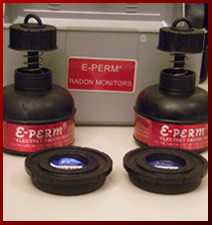Frequently Asked Questions about Radon Testing
Pennsylvania residents often call us with questions about radon, and today we will discuss some of those frequently asked questions about radon testing.
Why Should I Test My Home for Radon?
Radon is one of the leading causes of lung cancer in the United States and affects thousands of people every year. One of the significant reasons why radon is so dangerous is because the gas is undetectable to human senses. Radon lacks any odor, color, or scent, so the only method of knowing whether a home has high radon levels is through testing.
Do I Need to Test My Home if I Have a Passive Radon System?
Passive radon systems help reduce radon levels in a home, but levels could still be higher than the EPA considers safe. Passive systems have no fan or power source, and if your levels are high, you may need to convert to an active system. Regular testing, at least every two years, can keep your family safe and offer you peace of mind.
Do New Homes Need to Be Tested?
Any home has the potential for radon presence, because the soil under the foundation could harbor the dangerous gas. Pennsylvania has high radon levels. In fact, the average radon level in PA homes is around 7-8 picocuries per liter (pCi/L), and the EPA recommends that homeowners take action at 4 pCi/L. The EPA says in 49 of 67 Pennsylvania counties the predicted average indoor radon screening levels exceed federal guidelines. So whether your home is new or has been around for years, a radon test is recommended.
When Should I Test My Home?
Generally speaking, radon testing can be done any time during the year and day, and for those looking to test their homes, as early as possible is encouraged. Some conditions, however, make can impact testing. Winter, for instance, is the ideal time for testing since radon levels are usually higher during winter, helping radon professionals prepare for a “worst-case scenario.” Conversely, avoid short term radon testing during storms or high winds, as air pressure and rapidly moving air can impact the results.
How Should I Test My Home?

While testing can be done with a kit, you should call a professional certified radon testing specialist for the most reliable results. A qualified radon testing specialist has undergone the proper rigorous training needed for the task and will know the best testing method for your home. If your home needs remediation, he/she will be qualified to advise you on the next steps.
For those buying a new home, testing the new home is recommended because radon can be found in any structure.
What Are The Different Testing Methods?
The two primary forms of radon testing are short-term and long-term. The short-term testing method is the quickest and lasts from 2 to 90 days. Long-term radon testing lasts for more than 90 days and gives the tester a better idea of a home’s year-round average radon level.
What is the Difference Between Active and Passive Testing Devices?
Passive testing equipment requires no power source and is left in an area for the duration of the testing period. The device works through exposure to the air and gets sent to a lab to be tested.
 Active equipment utilizes a power source. Some active testing systems offer sophisticated testing, such as recording peaks. This can be important because some mitigating factors, like storms, can cause spikes in radon levels.
Active equipment utilizes a power source. Some active testing systems offer sophisticated testing, such as recording peaks. This can be important because some mitigating factors, like storms, can cause spikes in radon levels.
Should I Use an Active or Passive Radon Test?
Passive testing may be fine in most situations where a homeowner just wants to know if he needs to take action to reduce radon. Active equipment can record events that could indicate interference in the testing. One example where this might be useful is in real estate transaction-related testing. Sometimes sellers may attempt to show only positive results. Check with your specialist to learn which type of testing will be best for your situation.
What Are Closed-House Conditions?
“Closed-house conditions” means that all doors and windows remain closed except to allow for normal traffic in and out. No fans that bring air into the home should be run during the test period. This type of condition is often recommended if the test will last for less than a week.
Can the Weather Impact My Radon Testing Results?
Yes. Air pressure and rapidly moving air can impact radon testing results. Therefore, if storms or high winds are forecast, you may want to choose another time to have the testing performed. Rainy days can result in considerably higher radon levels because they have typically lower barometric pressure.
Are Radon Levels Higher in Basements?
Radon rises up from the ground, through cracks or crevices. The gas will move up into the other areas of the house as well, but the concentration will likely be higher in a basement. For this reason, radon testing should always be performed in the lowest level of the house that is used by residents.
What Happens After My Home Is Tested?
What happens next depends on the results of the test. If your test results were under 4 picoCuries per Liter (pCi/L), a follow-up test sometime in the future is recommended, since radon levels change over time. If the test results were over 4 pCi/L, proceed with a follow-up test to be sure of the results. An average radon level of 4 pCi/L or higher on the first and second tests indicate a need for remediation, so you can discuss with your specialist what the proper next steps may be and possibly get a recommendation for a qualified mitigation company.
Contact Radon-Rid, LLC for Answers to Frequently Asked Questions About Radon Testing and Inspection
We know that protecting your family or those who come into your place of business is important to you. Making a correct evaluation of the radon levels in your home and determining the proper strategy for mitigating those levels is important to us. We have certified, experienced, and insured radon testing and inspection specialists on our staff, so you can have peace of mind and healthy bodies. If you have any more frequently asked questions about radon testing or would like a free consultation, contact us today.
We Want to Help
"(required)" indicates required fields
Radon – The Silent Killer
Radon In Your Home
- Learn More About Radon Levels in Your County
- Take a few minutes to browse our Get To Know Radon Online Presentation.
- When you are finished, be sure to tell a loved one about our testing programs offered in Berks, Chester, Delaware, Lancaster, Montgomery & Philadelphia Counties.